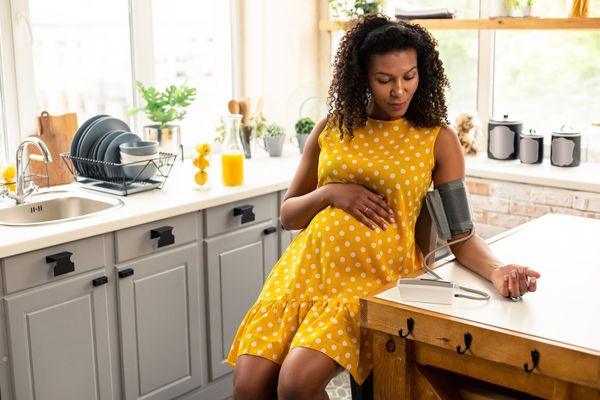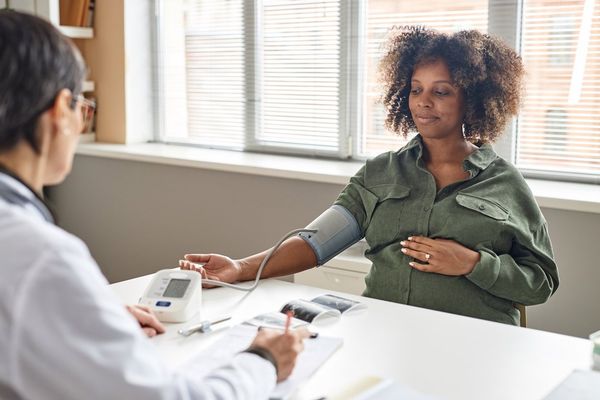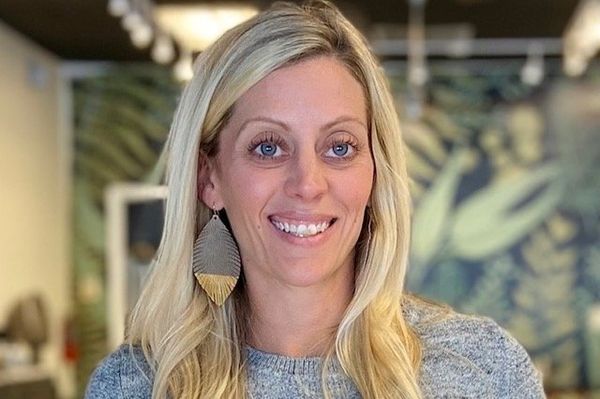As told to Liz Sauchelli
The blinding pain in my lower abdomen hit me when I was in the shower, causing me to double over. I knew I needed to go to the emergency room. I got out of the shower immediately, throwing on whatever clothes I could find, and rushed to my car. One thing that struck me was that there was no blood; later I’d find out that was because it was pooled in my abdomen, causing massive internal bleeding.
I still don’t quite know how I managed the five-minute drive to the ER. When I got there, I hung onto the counter, sweating profusely. The receptionist gave me paperwork to fill out and said someone would be with me shortly. I sat in the waiting room writhing in pain for what felt like an hour.
By then, my fiancé, Fernando, had joined me, and I was taken in for a vaginal ultrasound, which made my pain even more excruciating. The doctor told me I had an ectopic pregnancy rupture, and I needed to have emergency surgery because I was heading toward septic shock. Even as I started to cry, I finally felt validated.
I’d known there was something off about my body for months, but multiple healthcare providers (HCPs) had insisted that my intense pregnancy anxiety was the root cause of my symptoms and was making my pain seem worse than it was. Their insistence made me believe them over the clear signs from my body and the voice in my head that was screaming that something was seriously wrong.
Now I was paying the price.
Around three months earlier, I’d gone to urgent care with stabbing lower abdominal pain. Fernando and I had recently started doing an intense exercise routine, so I thought it was a hernia. The doctor felt my stomach and said I likely pulled a muscle or had irritable bowel syndrome (IBS) or even just gas. She sent me home, telling me to come back if I developed a fever or other symptoms.
After my visit to urgent care, I spent the next month adjusting my diet and exercise routine. Nothing helped. I went to a clinic with a yeast infection and, after a urine test, I got some unexpected — though welcome — news: I was pregnant.
Fernando and I had been trying to get pregnant for years and had suffered a miscarriage the year before. So I was filled with anxiety, afraid that it could happen again, and I was also confused by the results: I’d still been getting my period. The doctor told me that was normal. When I got home, I booked a prenatal appointment at another provider. For the first time since the miscarriage, Fernando and I felt good about our prospects for becoming parents.
The excitement was short-lived. A week before my prenatal appointment, my lower right abdominal pain got worse. I called the birthing center and an HCP was able to see me that day. During a pelvic exam, the OB-GYN pressed on the right side of my lower abdomen and I screeched out in pain. He told me I had an ovarian cyst.
I had told him I’d had a miscarriage the year before and was concernced about having an ectopic pregnancy. He also told me that it was normal for some women to continue to get their period while pregnant. There was nothing to worry about, he said, and suggested that the pregnancy anxiety I developed after my miscarriage was playing a role in how I was reacting to pain.
I asked if I could have an ultrasound, and he told me there would be a two-hour wait and it wasn’t necessary. I pressed him: Did he think there was any chance it could be an ectopic pregnancy? No, he assured me. If it was, I’d be doubled over in pain. He was so confident in his diagnosis — and seemed so trustworthy — that I believed him over what my own body was telling me.
After the visit, I went home, still in pain, and a week later the ectopic pregnancy burst. The emergency surgery I needed took most of my right fallopian tube and cut my chances of conceiving a child naturally in half. I was completely despondent.
The doctor sent me home that day and told me that we could try to get pregnant again in three months. In some ways, the emotional pain from this experience was worse than after my miscarriage: Not only had I lost a pregnancy, but my symptoms had been repeatedly dismissed.
The irony is that, for the last 12 years, I’ve worked with at-risk youth to teach them how to advocate for themselves. I sit with them at doctor’s appointments and court hearings. I teach them that the best way to have their voices heard is to go in with facts, stay calm and speak with confidence. I did all that and I still wasn’t heard.
The symptoms my providers dismissed as “normal,” were not normal at all — but because of my anxiety, I trusted what they said more than myself.
Two months after my surgery, I started seeing a new OB-GYN and she told me that the first OB-GYN I saw would have discovered the ectopic pregnancy if he’d done the ultrasound I’d requested. Then, I could have been given drugs to pass it and likely would not have lost my right fallopian tube.
Almost seven months have passed since my surgery, and I have not been able to get pregnant. I am now 38 and Fernando and I have slowly started to explore in vitro fertilization (IVF).
I continue to have anxiety surrounding pregnancy. Since I can no longer trust my period as a good indicator, I sporadically take pregnancy tests. And, as badly as I want to get pregnant, I’m also terrified because of what I’ve been through. Not only do I not trust my body I also don’t trust HCPs to listen to me. Therapy has been instrumental in teaching me how to cope with those feelings.
More than anything, I regret telling my providers about my health anxiety. I feel like they judged me and were quicker to dismiss my concerns because of it, even though I was clearly in pain. I let my inner voice be crowded out by their medical expertise because I thought they knew more about my body than I do. Now as Fernando and I continue to try to get pregnant, I’ll be listening to my inner voice first — even if HCPs try to convince me it’s all in my head.







